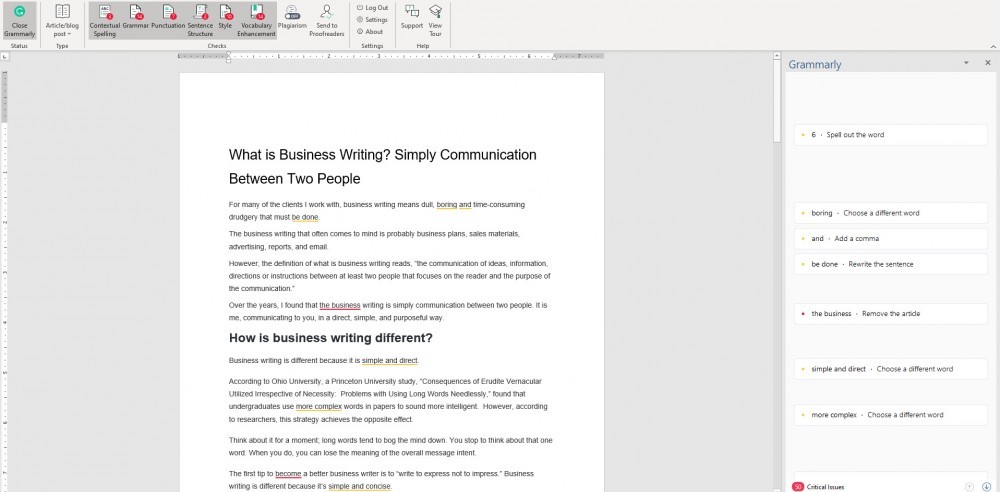For many of the clients I work with, business writing means dull, tedious and time-consuming drudgery they have to complete.
The business writing that often comes to mind is probably business plans, sales materials, advertising, reports, and email.
However, the definition of what is business writing reads, “the communication of ideas, information, directions or instructions between at least two people that focuses on the reader and the purpose of the communication.”
Over the years, I found that business writing is simply communication between two people. It is me, communicating to you, in a direct, simple, and purposeful way.
How is business writing different?
Business writing is different because it is direct and straightforward.
According to Ohio University, a Princeton University study, “Consequences of Erudite Vernacular Utilized Irrespective of Necessity: Problems with Using Long Words Needlessly,” found that undergraduates use more complex words in papers to sound more intelligent. However, according to researchers, this strategy achieves the opposite effect.
Think about it for a moment; long words tend to bog the mind down. You stop to think about that one word. When you do, you can lose the meaning of the overall message intent.
The first tip to becoming a better business writer is to “write to express not to impress.” Business writing is different because it’s simple and concise.
Throw out the English term paper or MBA Thesis language. Express yourself clearly, simply and in a direct way, and you will communicate better to your business reader.
Your business writing style
 When you talk to someone, how do you convey ideas?
When you talk to someone, how do you convey ideas?
Do you labor on about details? Do you intentionally use complex words to impress?
I’m sure you don’t. More than likely you concisely present your ideas, add your personality and flair, bring emotion and conviction in to play, and clearly and concisely express your point of view.
Now, take that same principle and apply it to your business writing.
One of the easiest ways to improve your writing (and make business writing enjoyable) is to write the same way you talk. However, instead of talking, put your idea on paper.
If you’re a strong typist, key it into a word processing document.
If you’re not a great typist, use a legal pad and write your ideas down. Then add your written words into a word processing document after the fact.
You can even record your ideas as you speak them. Save the recording and turn it over to a transcription service to create a word processing document you can edit and use in your written communication.
You can find reasonably priced transcription services on Fiverr and other freelancing websites.
While it will take practice to build confidence as you develop your unique writing style, the quickest path is to write the same way you talk. Express ideas as if you were talking to a trusted colleague.
When you do, the businesspeople you communicate with will give you their trust, because your business writing feels authentic, and authenticity is the quickest path to trust and credibility building.
How to build confidence in your business writing
 As you get started, business writing may seem like a burdensome chore. You’ll stare at a blank page. You likely won’t know what to write.
As you get started, business writing may seem like a burdensome chore. You’ll stare at a blank page. You likely won’t know what to write.
Here’s how to overcome writer’s block and get your ideas down efficiently.
Start with one sentence. What is the topic of the information you are you going to communicate?
Under that, jot down 3 to 5 sub-points about your topic.
Inside of the 3 to 5 sub-points jot down 3 points you’ll discuss in each idea.
Now you have an outline. All you need to do is fill in the blanks to create your written communication.
Remember to write the same way you talk.
Realize that when you start to commit your thoughts to paper, you’ll be worried about grammar, punctuation, sentence structure, and other things you learned through your educational system.
At this early stage, don’t think about writing mechanics. I’ll show you a powerful tool that will take away all your technical writing worries in a moment.
The only way to become is a better writer is to write – commit words to paper. Once you have your thoughts on paper, it’s time to polish your writing.
The most powerful tool I’ve found for editing is called Grammarly. It is your AI-powered writing assistant.
With 20 million people using the tool it is proven to work well. Grammarly will correct spelling, punctuation, and grammar, plus writing style and tone.
Grammarly helps you eliminate errors and find the perfect words to express yourself in email and messages, documents and projects, and even social media.
Grammarly is free to use and works with the Chrome browser. It gives you confidence and helps you overcome worry about perfect writing.
Now you can write the same way you talk. Then let Grammarly correct errors and improve your writing.
Keep your writing simple and be specific
 Ohio University Center for Professional Communication published a helpful PowerPoint presentation with ideas for business writers.
Ohio University Center for Professional Communication published a helpful PowerPoint presentation with ideas for business writers.
In it, they noted that style is how you express an idea. It is not the substance of the concept. The style consists of words the writer uses and how the writer combines those words into sentences, paragraphs, and complete messages.
In the first draft, they suggested that you don’t worry about style but focus on content instead.
I found a great way to do that is to outline the idea, as we talked about earlier, then write, by filling in the blanks of the outline you created. In other words, “talk” on paper, get the idea out of your head and into written form.
Then make revisions where you focus on the style. Here is where you’ll use Grammarly to make revisions stress free and dare I say, even enjoyable.
Here’s how you can stay focused on the essential elements of business writing.
Seek to express rather than to impress. Remember, complex words tend to bog the mind down and minimize engagement with your message.
Write clearly and concisely. Be accurate and complete and use familiar words.
Use more straightforward language and sentence structure. Eliminate wordiness and keep your writing simple and direct.
Use active voice and recommend action in your written business communication. Avoid using we believe, we think, we imagine – Grammarly will help you here.
Convey an appropriate tone. Be courteous and sincere and use positive language.
The shortest path to becoming an accomplished business writer
 Remember, business writing is simply communication to a reader. When you write the same way you talk, you are communicating effectively to another person.
Remember, business writing is simply communication to a reader. When you write the same way you talk, you are communicating effectively to another person.
However, when you write as you learned through education, your business writing becomes stiff, boring, and ineffective.
Keep your business writing clear, concise, and straightforward. It will be easier to understand. It also builds trust and credibility. Plus simple, clear, and concise writing is more effective.
Don’t stress about the mechanics of writing. Use AI-powered Grammarly to ensure your written communication is compelling and error-free.
What have you struggled with most in your business writing? I’ll be happy to answer questions or provide ideas that can help.
Leave a comment below with any questions. If you have a business writing tip you’ve used before, feel free to share it too.


I couldn’t agree with you more, there are times where I had to spend much time on the meaning of a word whiles searching for a solution to my problems on websites. It makes me think for a second….who’s is this blogger writing for? I guess not me so I live the website usually…..
As you rightly said, it’s very easy to flow when writing in a conversational form rather than trying to prove to readers that you’ve got the dictionary in your head. Personally, I do struggle a lot when trying to write in such a way and I’m glad you’ve pointed out in your article. Thanks
Isn’t that the truth? Get the brain thinking ‘who’s it for’ and it always responds with “not for me.” Interesting isn’t it?
I learned that one way to get the “conversational” writing flow going is to stop writing and start recording. Record what you have to say about a topic and then transcribe it. You won’t be able to help writing in a conversation style doing it that way.
After doing that several times, I’ll bet the conversational style of writing will also creep into your written words naturally.
Thank you Bill. I think this is a great article. Formatted very well and very smooth to read. I am starting a website and one thing that helped me with my writing was that each article is sort of like interactive with the people who read it because people actually comment on my articles and asked me to clarify stuff and all that kind of stuff. So it really helps.
I like the idea that you can just use a communicating style in your writing instead of having to worry so much about perfect writing structure and all of that kind of stuff.
I think my secret to being able to write is that I don’t think a lot about writing technique. I just sort of let the ideas flow out and sometimes I polish up the structure a little but I don’t get jammed up with writing technique. Another way of putting it would be that I let go of perfectionism. Anyway you have a great website here and I’ll probably be back again soon. Happy writing and take care.
Thanks for your comment, Charles. Since you’re getting comments, it sounds like your writing style is connecting to your readers well. You know, I think there is a huge advantage to NOT having a lot of writing training.
It’s the same in art – people who study a topic seem to have trouble breaking free of the “rules” and doing their own thing. Keep talking TO your audience and I’m sure you’ll see great engagement. Good luck.
I totally agree with this. I’ve tried writing articles with the intent of showcasing my vocabulary, but somehow, I was unable to connect well with my readers. It took some time for me to realize that what keeps readers glued to my articles is not the complexity of my sentences, but it’s the simplicity of how I organized the information I’m sharing. Even with your post right here, I managed to read it in a few minutes because it’s direct to the point! And, yes, Grammarly is a big help too!
Spot on, Ron. Simple is easy to read. Make it hard to read and understand and your reader/listener runs out the door quickly. The Grammarly writers tool saves time in editing and polishing docs. It sounds like you’re a fan too.
Hi Bill Gluth
Thanks a lot for sharing such an important and unique content to us. I really didn’t know that how to express a business idea with others people through business writing. Some times we forgot our ideas as we don’t write it or record it. But I learnt from here that if we write our business ideas it will work as a reminder. But we should use the very simple and specific words to express our idea to other people.
As I knew many important direction about business writing I will definitely share this post with my friends and family.
Thanks again.
Thanks for your insights Monalisha. So true, writing ideas down is the ONLY way to make sure you remember them, so they can ‘get done.’ That’s the hard part, isn’t it?
I’m pleased you’ll share this post with friends and family. I hope you’ll also share the writing secret weapon, Grammarly, I talked about in the article. It is a HUGE help in making business writing easer and more impacting.
Thank you Bill, this is really a great article and it is of great help to my writing
You made an interesting point when you mentioned that the only way to become a better business writer is to actually write. If you are trying to become a better business writer, would it be a good idea to hire a proofreader? I would think that a proofreader would be able to help you identify common mistakes you make and help you develop better habits.
Yes, Henry, I agree that a proofreader will help create better writing habits quicker than a business owner could do independently. Thanks very much for your comment and insights.